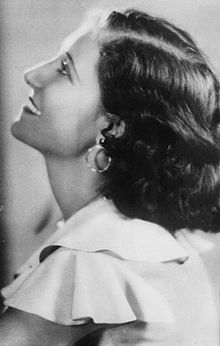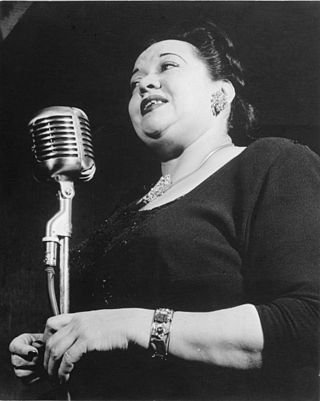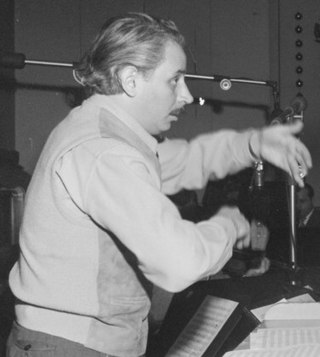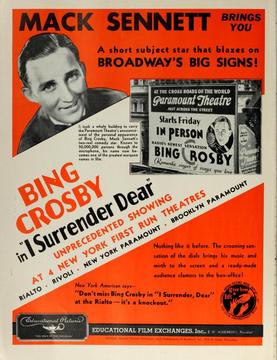Loyce Whiteman | |
|---|---|
 1931 | |
| Background information | |
| Born | 1913 |
| Died | July 3, 1989 (aged 76) |
| Occupation(s) | Vocalist |
Loyce Whiteman (1913-1989), also known as Lois Whiteman, was an American popular singer.
Loyce Whiteman | |
|---|---|
 1931 | |
| Background information | |
| Born | 1913 |
| Died | July 3, 1989 (aged 76) |
| Occupation(s) | Vocalist |
Loyce Whiteman (1913-1989), also known as Lois Whiteman, was an American popular singer.
Born in Dallas, Texas, and raised in Glendale, California, where she attended Glendale High School. She got her start in a singing contest and was engaged as a vocalist with radio station KTM. Moving on to station KFWB, [1] it was there that she was asked to audition for Gus Arnheim & His Cocoanut Grove Orchestra in 1931 at the age of 18.
The audition was successful. The book Bing Crosby: The Hollow Man describes Loyce's opening night at the Cocoanut Grove on Easter Sunday night, April 5, 1931. She had been very nervous at her audition, but this was nothing compared to her opening-night jitters. Bing Crosby, then one of The Rhythm Boys, was beside her as it came time for her to go on, and she nervously commented to him that she did not know what to do with her hands. "Bing did a sweet thing that night," Loyce said. "He said, 'Don't worry about it. I'll hold your hand,' and he accompanied me to the mike, held my hand, and sang half a chorus with me to get me started. I'll never forget that." [2] On May 1, 1931, Loyce made a record with Crosby and the Gus Arnheim Orchestra called "Ho Hum!" [3]
While singing with the Orchestra, she met Harry Barris. They were married in 1931. [4] They appear together in an episode of Rambling 'Round Radio Row , where she sings his composition, "It Was So Beautiful." They had a daughter, Marti Barris, who was born on April 6, 1937, in Hollywood, California and who became a singer as well. They divorced in 1946. Loyce later married Ken Hubbard, captain on the Santa Barbara police force. [5]
Together with Marti, Marti Music, a music publishing company, was formed. They wrote songs together, including "Coffee Date," recorded by Ella Mae Morse, and "Scottish Fling", to which Marti provided a melody and Loyce provided lyrics. [5]

Harry Lillis "Bing" Crosby Jr. was an American singer, actor, television producer, television and radio personality and businessman. The first multimedia star, he was one of the most popular and influential musical artists of the 20th century worldwide. Crosby was a leader in record sales, network radio ratings, and motion picture grosses from 1926 to 1977. He was one of the first global cultural icons. Crosby made over 70 feature films and recorded more than 1,600 songs.

Mildred Bailey was a Native American jazz singer during the 1930s, known as "The Queen of Swing", "The Rockin' Chair Lady" and "Mrs. Swing". She recorded the songs "For Sentimental Reasons", "It's So Peaceful in the Country", "Doin' The Uptown Lowdown", "Trust in Me", "Where Are You?", "I Let a Song Go Out of My Heart", "Small Fry", "Please Be Kind", "Darn That Dream", "Rockin' Chair", "Blame It on My Last Affair", and "Says My Heart". She had three records that reached number one on the popular charts.

Ruggiero Eugenio di Rodolfo Colombo, known as Russ Columbo, was an American baritone, songwriter, violinist, and actor. He is famous for romantic ballads such as his signature tune "You Call It Madness, But I Call It Love" and his own compositions "Prisoner of Love" and "Too Beautiful for Words".

Leonard George Hayton was an American musician, composer, conductor and arranger. Hayton's trademark was a captain's hat, which he always wore at a rakish angle.

Bing: A Musical Autobiography was Bing Crosby's fourth Decca vinyl LP, recorded and released in 1954.

The Rhythm Boys were an American male singing trio consisting of Bing Crosby, Harry Barris and Al Rinker. Crosby and Rinker began performing together in 1925 and were recruited by Paul Whiteman in late 1926. Pianist/singer/songwriter Barris joined the team in 1927. They made a number of recordings with the Whiteman Orchestra and released singles in their own right with Barris on piano. They appeared with the Whiteman orchestra in the film King of Jazz, in which they sang "Mississippi Mud", "So the Bluebirds and the Blackbirds Got Together", "A Bench in the Park", and "Happy Feet". They are best remembered for launching Crosby's solo career, one that would make him the greatest song charting act in history and one of the most influential entertainers of the twentieth century.

Harry Barris was an American popular singer and songwriter. He was one of the earliest singers to use "scat singing" in recordings. Barris, one of Paul Whiteman's Rhythm Boys, along with Bing Crosby and Al Rinker, scatted on several songs, including "Mississippi Mud," which Barris wrote in 1927.

Al Rinker was an American musician who began his career as a teen performing with Bing Crosby in the early 1920s in Spokane, Washington. In 1925 the pair moved to Los Angeles, eventually forming the Rhythm Boys trio with Harry Barris.

Gus Arnheim was an American pianist and an early popular band leader. He is noted for writing several songs with his first hit being "I Cried for You" from 1923. He was most popular in the 1920s and 1930s. He also had a few small acting roles.
"Wrap Your Troubles in Dreams" (also known as "Wrap Your Troubles in Dreams (and Dream Your Troubles Away)") is a popular song written by Harry Barris with lyrics by Ted Koehler and Billy Moll, published in 1931.
"Lies" is a popular song with music by Harry Barris and lyrics by George E. Springer. It was published in 1931.
"Them There Eyes" is a jazz song written by Maceo Pinkard, Doris Tauber, and William Tracey that was published in 1930. One of the early recorded versions was performed by Louis Armstrong in 1931. It was made famous by Billie Holiday, who recorded her version in 1939 for Vocalion Records. A version by Emile Ford & The Checkmates reached number 18 on the UK Singles Chart in 1960.

"Mississippi Mud" is a 1927 song written by Harry Barris, first sung by Bing Crosby as a member of Paul Whiteman's Rhythm Boys. Its musical composition entered the public domain on January 1, 2023.

"I Surrender Dear" is a song composed by Harry Barris with lyrics by Gordon Clifford, first performed by Gus Arnheim and His Cocoanut Grove Orchestra with Bing Crosby in 1931, which became his first solo hit. This is the song that caught the attention of William Paley, president of CBS, who signed him for $600 a week in the fall of 1931.
Gordon Clifford was an American lyricist who wrote music for Hollywood films in the 1930s. His best-known songs include Nacio Herb Brown's "Paradise", Alfred Newman's "Who Am I?" and Harry Barris's "It Must Be True" and "I Surrender Dear".
This is a list of Bing Crosby songs he recorded twice or more during his career, excluding all of the 1954 re-recordings for Bing: A Musical Autobiography.

Marti Barris was an American actress and popular singer. She recorded for Keen Records during the late 1950s and early 1960s, but never had a big hit. She was the daughter of Harry Barris and Loyce Whiteman, both musicians.
"Sweet and Lovely" is an American popular song of 1931, composed by Gus Arnheim, Charles N. Daniels, and Harry Tobias.
15 Minutes with Bing Crosby was Bing Crosby's first solo radio series, which aired on the CBS network from September 2, 1931 until October 31 of the same year. It was to have a major impact on his career.

I Surrender Dear is a 1931 Educational-Mack Sennett Featurette starring Bing Crosby and directed by Mack Sennett. This was the first of the six short films Crosby made for Sennett and which helped launch his career as a solo performer.